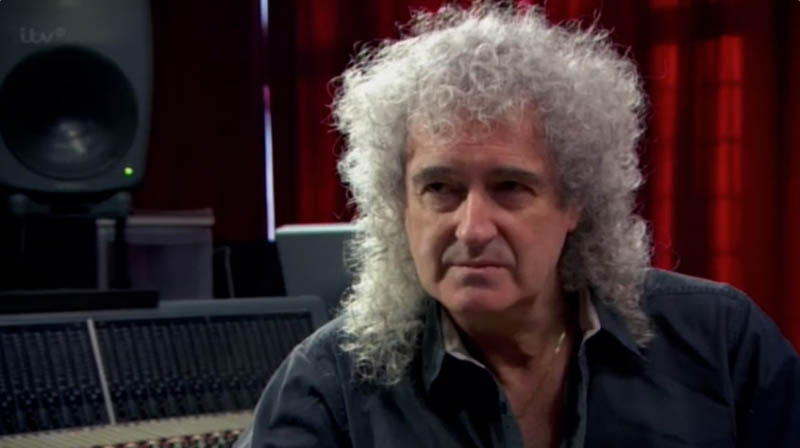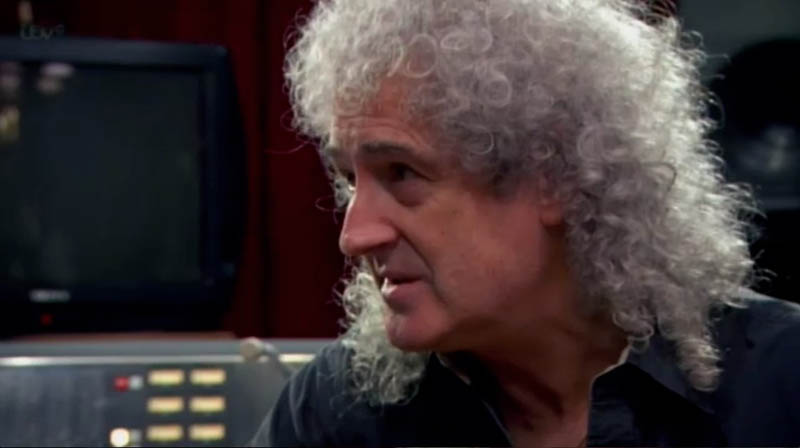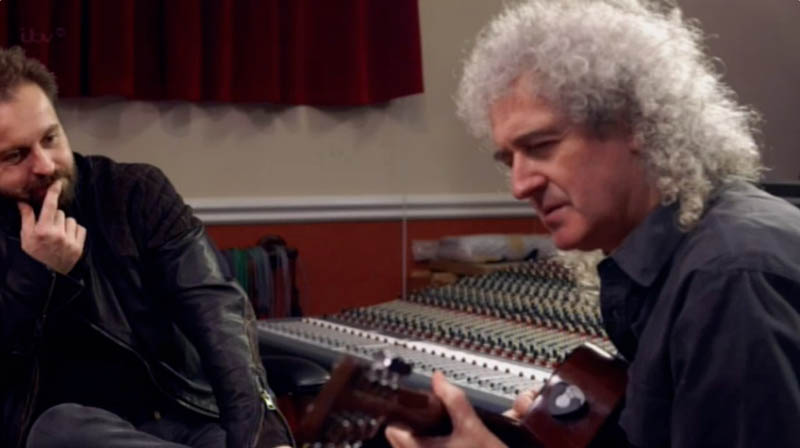
EXTRACT from full programme aired tonight: 10PM ITV1 in the UK.
TRANSCRIPT BY JEN TUNNEY, Brianmay.com – E&OE
=========================
<INTRO “KEEP YOURSELF ALIVE” PLAYS>
ALFIE BOE: When Freddie Mercury arrived in Britain in 1964 as the refugee, Freddie Bulsara, he was a shy boy in his old school blazer on the edge of the crowd. Within a decade be was one of the most famous rock front men on the planet. How did that happen?
In 1970 Freddie met Brian May, who, with Roger Taylor, already had a group of his own. I’m meeting my favourite guitar hero to find out how Freddie Bulsara transformed himself into Freddie Mercury…
BRIAN MAY… Is that… yeah…. (laughing)
ALFIE: I saw some old home footage of Freddie when he was at Isleworth
BRIAN: Yeah, yeah…
ALFIE: … and it was a totally different guy. He was in the background. Always at the side of the shot. Always behind the crowd.
BRIAN MAY: Maybe the truth of the matter is that there was a catalytic thing that happened when we met Freddie, ‘cos I know that Freddie was inspired by us. He used to come and watch us and then he got very excited and maybe he saw in us what he wanted to be and where he wanted to be. Freddie said: “Ah”, you know, “I will sing for you”, and we went, “Really? You can sing, right?” ‘cos we had no idea. We’d only seen him like walking around and playing around, having lots of ideas. We knew he was a very dynamic kinda guy that we didn’t actually know if he could sing, but Freddie also was very kind of screamey. He was very into the posing and the running around and would kind of screech his lungs out, you know and …
ALFIE: How at that taken?…
BRIAN: Err… it went down well. But the biggest influence on Freddie was Freddie, and it happened when he started to record, because then of course once hear yourself coming back out of the speakers, it’s a very different thing. It’s so different to just doing things live, and as soon as Freddie was hearing himself coming back, he was visibly dissatisfied – and always searching, always trying to improve.
—
ALFIE: The band provided Freddie with creative, talented collaborators to help develop his untutored songwriting skills…
Freddie had this great idea called “Stone Cold Crazy” and it was all about… I don’t know what the hell it’s about. (laughing) … one of Freddie’s frentic ideas. But it wasn’t a frenetic song, it was like… (plays guitar) … or something like that. So when we got together, I said “Freddie, would it be fun if we did it like more frenetic like the way you normally are?” So I did this… (plays riff) But he liked that, so the song instantly became che ka, che ka, che ka, che ka… Sleeping very soundly on a Saturday morn, I”, and that was really something that gelled with us very quickly.
<EXTRACT STONE COLD CRAZY PLAYS>
ALFIE: Once Freddie had an outlet for his voice and his music, the final exuberant part of his character, the performer, emerged, backed up with a determination to carry everyone with him.
BRIAN MAY: Freddie was all about giving a show, connecting with an audience, and those are concepts which we really had kind of ignored, ‘cos in those days, you know, that wasn’t the way things were done. Most people doing what we did just sort of stood on stage and got into the music between themselves and kind of ignored the audience. So this idea… Freddie comes in and goes “No. No that’s not what it’s about. It’s about entertaining those people – costumes, lights, sound – everything”.
<STONE COLD CRAZY PLAYS>
<EXTRACT BOHEMIAN RHAPSODY PLAYS>
ALFIE: All the elements of Freddie’s self-taught passionate and wide-ranging creativity came together in 1975 when Freddie broke all the rules with “Bohemian Rhapsody”. For me, with this mixture of ballad, mock opera and rock, it’s just one of the greatest songs ever.
BRIAN: “Rhapsody” (laughs) was really a product of Freddie’s fevered brain, you know, more than anything else, and yes, we did contribute loads, but he had this amazing kind of blueprint in his head of how it should sound – and he came in with most of those harmonies all written out and we would work them out on the piano, particularly Freddie. He would work everything out on the piano, because if the chords sounded right on the piano, it was gonna sound okay – for a singer.
ALFIE: It caused a musical sensation that has lasted 40 years. This clip from Wayne’s World in 1992 illustrates how the song became part of our cultural DNA.
<WAYNE’S WORLD CLIP>

